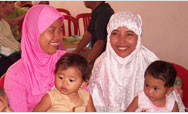Social Development and Conflict  | | Children at play with Russian military
personnel inKurchaloy, Chechen Republic,
as part of a USAID projectto promote youth
tolerance. | The Issues The development of healthy social institutions, services, and relations are essential to a stable society. Accordingly, development assistance has long included programs that focus on social issues like education, youth, health care and gender development. However, unbalanced or inequitable social development can create tension and exacerbate the potential for violent conflict. To avoid these complications, aid programs need to incorporate conflict sensitivity into their design.
Youth In many developing countries, young people are coming of age in societies that lack stable government, economic growth, or basic material and physical security. When young people are uprooted, jobless, and alienated and have few opportunities for positive engagement, they are a ready pool of recruits for groups seeking to mobilize violence. DCHA/CMM is helping USAID to engage young people often left behind by more traditional development programs. Programs include reintegration of former child soldiers, youth-targeted programs in community dialogue, opportunities for youth to participate in the political arena, and job training and employment programs. Education Education has long been viewed as an unambiguously positive force. There is a growing body of evidence, however, that education can intentionally or unintentionally sow the seeds of violence. Exclusionary language policies, extremist ideologies, unequal access to education, and biased curricula can all fuel intolerance and violence. DCHA/CMM is working with partners to identify and promote conflict-sensitive education programs, including new teaching methods, policies that ensure equitable access to education, and community outreach that reinforces peace-building education efforts among parents and community members.
Gender Armed conflict causes immense suffering to everyone it touches, however women and children are affected in unique and challenging ways. Women are often the victims of sexual violence, children lose their parents and homes, and women must take on new responsibilities as husbands, brothers, and fathers are killed or forced to flee. Despite these challenges, women can play a decisive role in promoting peaceful solutions to conflict. All of these issues are explored in our women and conflict guide. DCHA/CMM is also exploring programs that will draw on the unique strengths of women in peace-building and is seeking ways to involve women in the implementation of conflict-related programs.
Health Health activities offer a number of unique opportunities for peace building. In divided societies, issues such as infectious diseases and maternal and child health care are often important to all sides. Given that health programs are seen as relatively neutral, they can provide an entry point for dialogue about more controversial issues. Health activities are increasingly being designed to improve public health while contributing to conflict management. Temporary cease-fires have been brokered in order to implement immunization campaigns, political leaders have been brought together to agree on health policies and priorities, and members of divided communities have worked together to rebuild or improve access to health care. Activities such as these have been able to foster reconciliation in a number of countries, including Uganda, Mozambique, and Angola.
Our Work The Office of Conflict Management and Mitigation (DCHA/CMM) works with USAID Missions to better integrate youth into assistance activities, especially uprooted young men at risk of joining potentially violent movements to find a job - or even food and shelter. For example, in Georgia, DCHA/CMM provided funds for multi-functional youth clubs under the Urban Grant Partnership Program. The program engaged youth in extra-curricular and other healthy activities; developed leadership, social, and work skills; improved ethnic understanding; and increased confidence-building among youth.
In the North Caucasus region, DCHA/CMM supports a variety of locally-driven initiatives that work to reduce violence and keep the peace. In Chechnya, funds have been directed at community rehabilitation. One project focused on bringing Russian servicemen together with elementary school children to rehabilitate a school playground and re-shape images the children held of military personnel. DCHA/CMM support is also fostering active communication between youth activists, NGO leaders and authorities in Southern Russia to increase understanding of the ethnic, religious and cultural diversity in the region, and to prevent the resurgence of conflict.
Back to Top ^
| 

